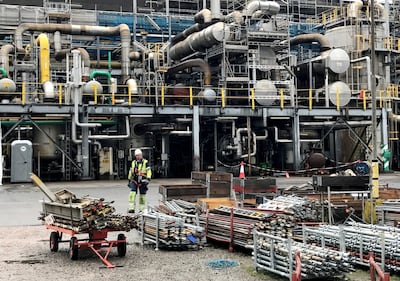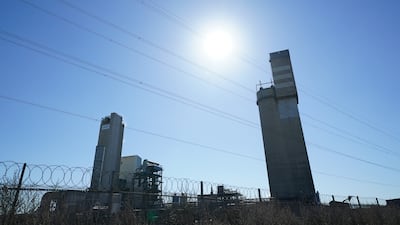The mounting global gas crisis has raised the spectre of Britain rationing energy and being forced to impose a three-day working week.
A surge in gas prices globally has already led to the closure of two of the UK’s largest fertiliser plants, prompting supply fears in the food industry. A number of energy suppliers have collapsed, with more on the precipice.
It has led to days of emergency talks between the UK government and energy leaders, who are calling for a state bailout.
The gradual reduction of gas supplies in the UK has led to its reliance on European imports. But with price increases affecting the whole of Europe, there are rising fears that the UK will soon be on an energy knife-edge.
Clive Moffatt, chairman of the Gas Security Group, told the British government three years ago that this could happen.
The GSG was established in 2017 following the closure of the UK’s Rough gas storage facility, which accounted for 75 per cent of all the nation’s gas storage.
Now, he says, the country could face returning to a 1970s-style three-day working week if the situation worsens.
The UK last experienced a three-day week during 1974, when commercial users of electricity were forced to limit their operations due to a coal shortage caused by industrial action by coal miners and railway workers.
“A lot of suppliers cannot afford to exist any more because prices have gone up and they are facing going bust,” Mr Moffatt told The National.
“The suppliers who take on their clients will charge more money and prices are going to go up.
“Whilst there is quite a lot of volatility in the market, the situation is going to get worse rather than better.
“Gas is our major energy supply, as we have shut down coal and nuclear power is being phased out. We are basically without gas if there is any shortage of supply.
“The industry has been turned off before. When we had the Beast from the East [cold spell in 2018] industries were forced to close down, some for a couple of months because they simply could not get supplies. What is happening now could see a repeat of that. The UK totally depends on imports.
“It could see a return to shorter working weeks.”

The UK has some of the lowest storage supplies in Europe, with less than nine terawatt hours of storage compared to 75 terawatt hours in the Netherlands, 113 terawatt hours in France and 148 in Germany, according to Gas Infrastructure Europe.
Amrik Bal, director of trade organisation the Energy Intensive Users Group, told The National the UK government needed to take “urgent” steps to address the crisis.
“We are requesting an urgent meeting to discuss the impact with the government,” he said.
“The UK needs to take steps to mitigate the recent surge.”
Gas prices are 50 per cent higher than last year and are reaching record levels in Europe.
As well as gas costs curbing output of fertilisers, which are crucial to the food industry for its crops, plant closures could further tighten supplies of carbon dioxide, which is produced as a by-product.
The gas is used to stun poultry and pigs and for use in packaging to extend the shelf life of products such as meat and vegetables.
Energy analyst Clive Black, senior adviser to Coriolis Consulting, told The National the government needed to “urgently” address the situation otherwise businesses and consumers would be greatly affected at Christmas.
“Running a food business is something more akin to an Indiana Jones movie presently, with obstacle after obstacle being put in the way,” he said.
“To compound matters there is the shortage of lorry drivers, which is already hitting availability in stores, especially small ones, whilst choice is also starting to be impacted as farmers and manufacturers prioritise their work to maximum impact.
“If all this is not bad enough, the C02 issue, has come around quickly. It needs urgent resolution because it’s quite crucial to animal welfare and the effective working of the meat industry, plus, of course, as an ingredient to carbonated drinks.
“Cumulatively, there is the distinct prospect of less choice for shoppers at Christmas and higher prices.
“Without a resolution to the C02 matter soon, poultry and pig stocks could diminish quickly.
“Also, logistical issues in Asia, plus higher freight costs, container capacity matters and driver shortages in the UK means that it will not only be foodstuffs where supplies may be challenged in the run-up to Christmas.”
European gas stocks were left low following extended cold weather last winter.
The UK has also suffered a further blow after one of its biggest power cables responsible for importing electricity from France was forced to close until next March by a fire at a converter station in Kent.
It means the UK will be forced to rely more heavily on gas-fired power plants, which could increase the pressure on gas supplies.
Business secretary Kwasi Kwarteng told MPs there would be “no question of the lights going out” this winter, describing warnings about the gas crisis as “alarmist”.
“I must stress that protecting consumers is our number one primary focus and will shape our entire approach to this important issue,” he said.
“Secondly, I also want to reassure the House of Commons that while the UK like other countries in Europe has been affected by global prices, Britain benefits from having a diverse range of gas supply sources.
“We have sufficient capacity, and more than sufficient capacity, to meet demand and we do not expect supply emergencies to occur this winter.
“There is absolutely no question of the lights going out or people being unable to heat their homes. There will be no three-day working weeks or a throwback to the 1970s. Such thinking is alarmist, unhelpful and completely misguided.”
Four small energy suppliers have ceased trading in recent weeks and have been taken over by bigger suppliers.
Industry sources have warned there could be as few as 10 left by the end of the year from 70 at the beginning of the year.
Permanent Secretary for the Department for Business, Energy and Industrial Strategy Sarah Munby said taxpayers money was not “at risk” through big energy suppliers taking on the customers of collapsed smaller companies, but all bill-payers would see small amounts added to their bills.
“Ultimately, the supplier of last resort regime already contains provision for companies to be compensated for costs that they take on as part of that regime,” she told the Public Accounts Committee.
“The current process for how that extra cost is dealt with, just so you know, is that it’s fed out across the market over time.
“And ultimately, very small amounts appear on people’s bills down the line. We’re talking pence here.
“We’re not currently intending to put any taxpayers’ money at risk.”


